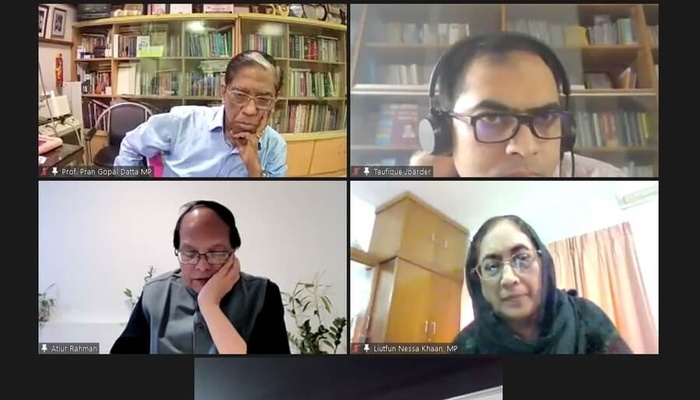

Finance Minister AHM Mustafa Kamal unveiled a proposed budget of Tk 678,064 crore for 2022-23 fiscal year in the national parliament on 9th June. This is his fourth budget and the first budget of the government after the Covid-19 pandemic. The budget-makers have considered the existing macroeconomic realities when allocating resources for the health sector for FY 2022-23.
However, they could have been a bit more liberal given the high demand for allocations in this sector. Primary healthcare-seekers in rural areas are bearing 68 percent of the total health expenditure. By allocating an additional BDT 8 thousand crore for health in the coming fiscal year, this ratio could be brought down to 51 percent- opined former Governor of Bangladesh Bank- Professor Dr. Atiur Rahman. He said these while presenting the keynote paper at a post-budget online dialogue session organized jointly by Bangladesh Health Watch, Brac James P. Grant School of Public Health, Brac University and Unnayan Shamannay. Former Information Minister and parliamentarian from Kushtia 02 Hasanul Huq Inu graced the event as the Chief Guest. Special Guests were Dr. Pran Gopal Dutta, MP (Cumilla 02), and Ms Lutfun Nesa Khan, MP (Women Seat 48).
The Chief Guest, in his remarks, emphasized developing a five-year plan for the health sector giving the highest priority to ensuring universal primary healthcare and then allocating the budget in alignment with that plan. Health insurance schemes were identified as the way forward by Dr. Pran Gopal Dutta, MP to ensure universal access to quality and affordable healthcare for all. He believes that the government should start piloting health insurance schemes as soon as possible. Other major recommendations coming out of this dialogue session are- increasing allocations for primary healthcare to reduce ‘out-of-pocket health expenditure’, increasing the supply of free-of-cost medicine and availability of diagnostic facilities at all government-run healthcare facilities, etc. Representatives from different government and non-government bodies related to public health participated in the question-answer session. Major points discussed were the lack of funding to deal with non-communicable diseases, the inadequacy of training on administration and accounts for health cadres, limited access to government-run health facilities in urban areas, etc.
Chaos and mismanagement have been addressed by most of the participants. Dr Be-Nazir Ahmed, Former Director, Disease Control, DGHS, says, “we have serious mismanagement in this sector and that is only because of the lack of adequate medical people. Right people are not in the right position. We are making well-equipped hospitals in upazilla levels but some of them are remaining empty because of the lack of medical technicians, doctors, nurses etc.” He also pointed out the deteriorated urban health condition of our country and suggested that to solve the problem we need to engage local govt more effectively.
Morsheda Chowdhury, Director, Health, Nutrition and Population Programme of BRAC stressed the issue of more public and private collaboration. “EPI, ORS etc programmes are carried by NGOs and became very successful. To make more such success stories, strong collaborations are needed.”
Representatives from different government and non-government bodies related to public health participated in the question-answer session. Major points discussed were the lack of funding to deal with non-communicable diseases, the inadequacy of training on administration and accounts for health cadres, limited access to government-run health facilities in urban areas etc.
On behalf of the organizers, Bangladesh Health Watch thematic group Chair Professor Dr. Rumana Haque delivered the welcome speech, and Unnayan Shamannay’s Project Coordinator Zahid Rahman moderated the session.
Dr Atiur Rahman ended the session by saying that in future budgets, we need to take care of the issue of the marginalized population. We must ensure the PHC for all the citizens.
There were 68 guests who participated in the event. The event got good media coverage as 10 renowned media houses covered the programme.
Recorded version of this event can be found here.
Event Video:
Media coverage of post-budget Webinar
| # | Media name | Links | Media type |
|---|---|---|---|
| 1 | Prothom Alo English | Health sector needs Tk 80b more: Ex-BB governor Atiur | Online |
| 2 | Desh Rupantor | স্বাস্থ্যখাতে বাজেট বরাদ্দ ও বাস্তবায়ন বাড়ানো সম্ভব: আতিউর রহমান | |
| 3 | Banglanews24 | স্বাস্থ্যখাতে বাজেট বরাদ্দ ও বাস্তবায়ন বাড়ানো সম্ভব: আতিউর রহমান | Online |
| 4 | The Business Standard | Experts for raising health budget to reduce out-of-pocket expenditure | Print and Online |
| 5 | Dailymail.com | স্বাস্থ্যখাতে বাজেট বরাদ্দ ও বাস্তবায়ন বাড়ানো সম্ভব: ড. আতিউর | Online |
| 6 | Dhaka Tribune | 8,000C should added to health budget, says former Bangladesh Bank governor | Online/Print |
| 7 | Amader Somoy | Experts call for higher allocation in primary healthcare | Print and Online |
| 8 | Financial Express | Increased health allocation can help cut out-of-pocket spending | Print and Online |
| 9 | The Daily Observer | https://epaper.observerbd.com/2022/06/18/9/details/9_r4_c1.jpg | |
| 10 | The Business Post | Rural people make up 68% of total health expense: Atiur | Online |
Citizen's Voice